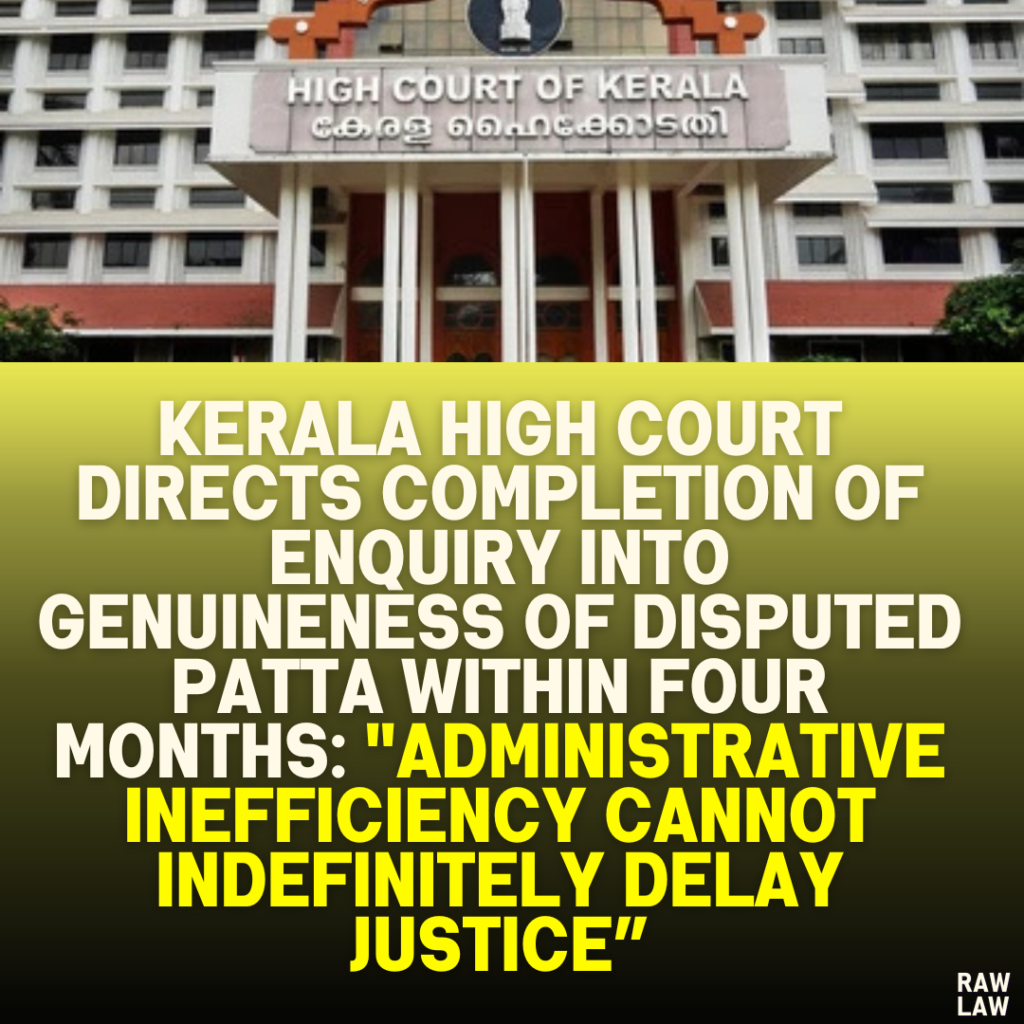1. Court’s Decision:
The Kerala High Court, recognizing the delay in completing the enquiry into the genuineness of the disputed patta (land document), directed the District Collector, Idukki, to finalize the investigation within four months. This direction ensures that administrative hurdles do not unjustifiably impede the petitioner’s property rights and transactions.
2. Facts:
- Property Ownership: The petitioner is the owner of 3.54 Ares of land in Kattappana Village, purchased via a registered sale deed in 2013 (Ext.P1).
- Patta Details: The land is associated with a patta (Ext.P2) issued in 1969 to the predecessor-in-interest of the petitioner.
- Tax Payments and Mutation: The petitioner and previous owners have been paying land taxes regularly after mutating the property into their names.
- Complaint and Enquiry: In 2019, an anonymous complaint raised doubts about the genuineness of the patta, leading to a protracted enquiry by the District Collector. Missing records from the Village Office complicated the investigation.
- Petitioner’s Hardship: The petitioner entered into an agreement to sell the land, but the ongoing enquiry stalled the process as the respondents refused to accept land tax payments during the investigation.
3. Issues:
- Delay in Enquiry: Whether the delay in completing the enquiry was justified given the circumstances, including missing files and conflicting records.
- Mandamus Relief: Whether the petitioner was entitled to a writ of mandamus directing the respondents to expedite the enquiry.
4. Petitioner’s Arguments:
- The petitioner argued that the prolonged enquiry caused significant inconvenience, including the inability to pay land taxes and finalize a sale agreement.
- It was emphasized that despite consistent tax payments and property mutation, the respondents’ reluctance to resolve the enquiry was unjustified.
- The petitioner sought judicial intervention to ensure a timely resolution of the dispute, claiming it was a matter of justice and fair administrative process.
5. Respondent’s Arguments:
- The respondents explained that the enquiry was delayed due to administrative challenges, including:
- Missing files concerning the issuance of Ext.P2 patta.
- Discrepancies in the issue register, which showed another patta with the same number.
- Preliminary investigation by the Vigilance and Anti-Corruption Bureau (VACB) recommended further enquiry under the District Collector’s authority.
- The respondents contended that every effort was being made to locate the missing records and resolve the issue.
6. Analysis of the Law:
- Writ of Mandamus: The petitioner invoked Article 226 of the Constitution, seeking a writ of mandamus to compel the respondents to act. This writ is issued when a public authority fails to fulfill its legal duty, causing harm to an individual’s rights.
- Right to Property: Although no specific precedents were cited, the case involves principles of property rights and the administrative obligation to maintain and verify public records.
- Administrative Efficiency: The law places an implicit duty on public authorities to resolve disputes efficiently, ensuring minimal impact on individuals’ rights.
7. Precedent Analysis:
While no specific judgments were cited in this case, the court relied on general principles governing writ jurisdiction:
- Courts have consistently emphasized the need for timely administrative action to prevent undue hardship.
- Precedents affirm the judiciary’s role in ensuring that government agencies fulfill their statutory and constitutional duties.
8. Court’s Reasoning:
- The court noted the petitioner’s grievance regarding the delay in completing the enquiry, recognizing its impact on the petitioner’s ability to transact with the property.
- While acknowledging the respondents’ explanation about missing files, the court emphasized that administrative inefficiency cannot indefinitely delay justice.
- The court determined that setting a time frame for the enquiry would balance the petitioner’s rights and the respondents’ administrative challenges.
- It held that the completion of the enquiry was critical to protecting the petitioner’s rights and ensuring transparency.
9. Conclusion:
The court allowed the writ petition, directing the District Collector to complete the enquiry within four months from the date of receipt of the judgment. It ensured the petitioner would have clarity regarding the patta’s genuineness without further delay.
10. Implications:
- For the Petitioner: The judgment offers relief by mandating a specific timeline for resolving the enquiry, enabling the petitioner to pay taxes and finalize the sale agreement.
- For Administrative Authorities: The judgment underscores the importance of maintaining and managing public records effectively. It reminds authorities of their duty to resolve disputes in a timely and transparent manner.
- Judiciary’s Role: This case illustrates the judiciary’s intervention in administrative processes to protect citizens’ rights and ensure accountability.




Pingback: Delhi High Court: Pandemic-Related Limitation Suspension Protects Defendant – No Delay in Entering Appearance Under Order XXXVII CPC - Raw Law